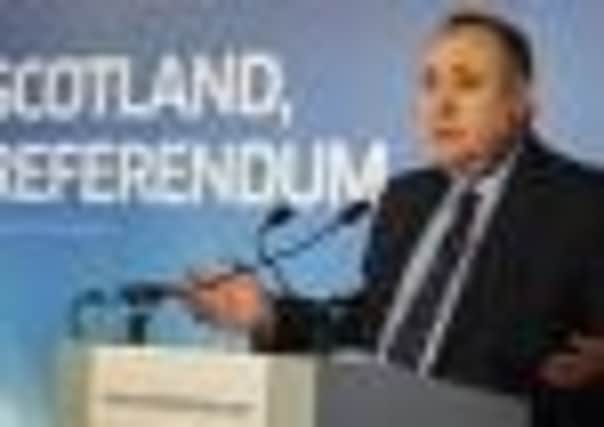Leaders: Choose words carefully to avoid a repeat of 1979


For decades after the 1979 devolution referendum, a narrow Yes vote for a Scottish Assembly, there was anger that Westminster had loaded the dice by demanding 40 per cent of those on the electoral register must vote Yes. Because, in those terms, only 32.8 per cent did vote Yes, devolution did not happen even though fewer, 30.8 per cent, voted No.
Alex Salmond seems determined to ignore this lesson. While, of course, there is no question of him introducing a threshold which a pro-independence vote must pass, he risks his independence referendum being seen as unfair because of his government’s preferred wording of the question to be asked.
Advertisement
Hide AdAdvertisement
Hide AdThis is the clear verdict of Westminster’s Scottish affairs select committee. It has criticised the proposed question – Do you agree that Scotland should be an independent country? – as biased. This, the report makes abundantly clear, is not because the committee is composed of unionist MPs, but because of the evidence that constitutional and opinion poll experts gave it.
Disappointingly, the Scottish Government’s cabinet secretary for parliamentary business, Bruce Crawford, has already dismissed the report as “devoid of credibility” because its title mentioned “separation”. The fact that nationalists want the word banned from all political discourse itself is evidence that the MPs are entirely right to raise the issue of how this question should be worded. Asking – Do you agree that Scotland should be a separate country? – would be equally biased and objectionable.
A significant concern is that the words “or disagree” are missing from the SNP’s version. Experts consulted by the MPs were unanimous in their opinion that a question which does not invite voters to agree or disagree is fundamentally loaded towards a Yes vote because it implies that No is not an alternative answer.
Research commissioned by Lord Ashcroft, which the experts contended is valid despite the peer’s Conservative affiliation, has clearly shown that the “Do you agree…” question is most likely to get a Yes vote; that “Do you agree or disagree…” is less likely; and “Should Scotland become an independent country or should it remain part of the UK?” gets the least positive response.
This may be disagreeable to the Nationalists, but they should remember the 1979 lesson. Wording matters, and so does the process by which the wording is decided. If the referendum and its outcome is to be accepted as fair and decisive, then the means by which the wording is determined must also be fair.
The Scottish Government should hand the matter over to the independent Electoral Commission. Failure to do so would leave suspicion of pro-Yes biasing alive, threatening rancour and dispute about the result.
Minority rule no small matter
Council rooms may not be smoke-filled, but many of them will be pretty steamy just now, as councillors in the 23 local authorities where no party secured a majority in last week’s elections try to hammer out coalition deals. In some areas – such as Midlothian, where the SNP has found one non-Nationalist (but pro-independence) councillor to prop them up – the task is easy. In Edinburgh, it wasn’t so simple but Labour and the SNP reached a surprise agreement.
Councillors should think hard before they seal deals. Having a majority is not the be-all and end-all of politics. As Alex Salmond’s 2007-11 Scottish Government showed, just because the government is in a minority does not mean the opposition is necessarily in a majority. Political opponents have to compete with other opponents just as much as with the ruling party, which can make minority rule easier than is often imagined.
Advertisement
Hide AdAdvertisement
Hide AdIt is also makes major political decisions more open and accountable to the electorate. Coalitions mean the ruling parties hide their differences and negotiations needed to reached agreement on major issues – which often turn out to be compromises that satisfy relatively few people – take place behind closed doors.
Minority rule, however, means that what opposition parties seek in return for their votes is made more visible. Electors gain greater knowledge of who is responsible for policies, and who to hold to account for failure.
Coalition does not guarantee success – the shambles of Edinburgh’s tram saga is ample evidence of that. Councillors should have more confidence in minority government. Sometimes, they can deliver the best service locally and be good for democracy.